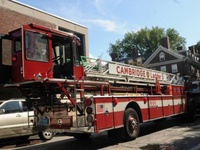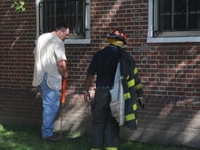
Firefighters rushed to Quincy House early Sunday evening as a gas leak forced students out of Old Quincy. The leak was likely caused by this weekend’s hard rains that weakened the soil around the gas main.
A gas main under Plympton Street cracked early Sunday afternoon, causing gas to seep into Old Quincy and the building to be evacuated for several hours.
The gas concentration was low enough to not constitute a serious fire danger, according to officials at the scene, and the gas company, NSTAR, was present and actively monitoring gas levels soon after the leak was identified.
The gas began filtering into the building through cracks in its foundation during the early afternoon yesterday, according to Cambridge Fire Department Deputy Chief Francis E. Murphy III. Outside Quincy on Plympton Street, the smell of gas was palpable throughout the afternoon.
Although gas levels inside the building were not of immediate concern, turning electric appliances on and off in the building could have caused a fire to break out, Murphy said, but with the building evacuated, that risk was minimized.
An NSTAR team excavated the gas main and plugged the leak by the evening.
According to witness reports, the leak likely started at around 1:30 or 2:00 p.m., but students were not officially informed of the situation until 3 p.m. Most students, instead, resorted to quizzing fire-fighters on the scene for information.
Harvard’s emergency messaging service remained silent throughout the afternoon.
At the time that the evacuation was ordered in Old Quincy, there was no smell of gas inside the building, said Andres D. Uribe ’12, who was inside when the alarm sounded. While gas in its pure form is odorless, it is odorized before delivery to households.
Gas levels in the basement of Old Quincy had begun to decrease by 3:30 p.m., Murphy said. The evacuation remained in place until 5 o’clock, when students were allowed to return to their rooms in Old Quincy.
But Murphy said he was surprised to find students in their rooms yesterday afternoon at all.
“Shouldn’t you be out partying on a day like this?” he asked.
Murphy added that this weekend’s “torrential” rains likely contributed to the leak, as the precipitation could have created sink-holes around the gas main, which had allowed the gas to escape from a pre-existing crack. The gas then likely followed the newly-installed water main that feeds Old Quincy’s sprinkler system into the building.
“The gas follows the path of least resistance,” Murphy said. “The soil around the recent excavation [for the water main] probably isn’t as compact as the surrounding soil.”
Despite the leak, the House’s Field Day celebrations and opening convocations continued in the Quincy courtyard.
Housemaster Deborah J. Gehrke, in full academic regalia, flourished the Quincy cane and admonished the gas leak that had threatened the ceremonies.
“I expunge this gas leak from Quincy.”
—Staff writer Elias J. Groll can be reached at egroll@fas.harvard.edu.
—Check thecrimson.com for updates throughout the afternoon.
Correction included: An earlier version of this story stated that gas had been turned off to Quincy House. In fact, Old Quincy does not have a direct gas supply. In addition, the main that supplies Quincy House is not the source of the leak, so it did not need to be turned off, according to Cambridge Fire Department Deputy Chief Francis E. Murphy III.
Read more in News
Marathon Racers Run for Charity














